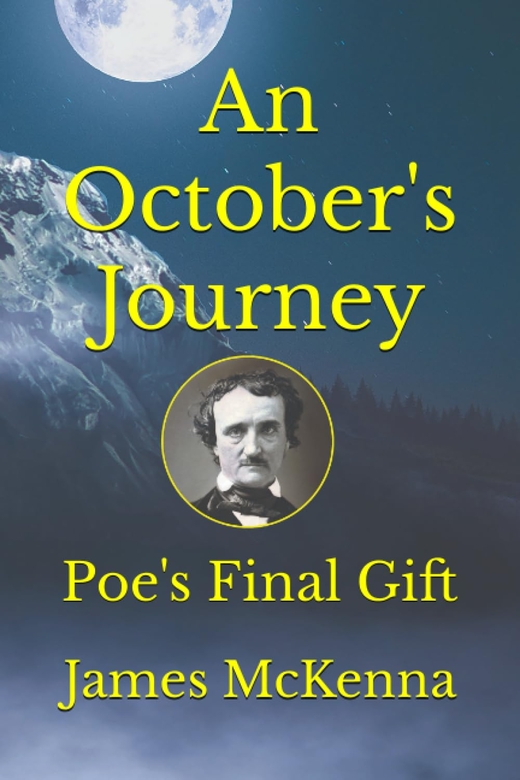 Luring readers into a carefully crafted tale of supernatural mystery, author James McKenna delivers a profoundly puckish novel in An October’s Journey: Poe’s Final Gift.
Luring readers into a carefully crafted tale of supernatural mystery, author James McKenna delivers a profoundly puckish novel in An October’s Journey: Poe’s Final Gift.
On October 1, 1849, on the occasion of his 22nd birthday, Jonathan Brandt’s party is graced and haunted by his father’s old friend “Eddy,” though the world better knows him as Edgar Allen Poe. In addition to his attendance, Poe also presents Jonathan with a macabre gift, an unbelievable story of witchcraft, and an invitation to join Poe on a nebulous (and undeniably dangerous) adventure.
Poe is trying to figure out the ending to a new story – or perhaps an old one – and he requires Jonathan’s specific skills as a barrister, but the case Jonathan agrees to argue will be anything but ordinary. For starters, the proceedings are being held in a place somehow fallen out of time, and the verdict of the case will determine the fate of many more than the three souls on trial. Navigating as a stranger in an even stranger land, Jonathan must piece together the truth of the most bizarre case of his career.
Giving fresh life to the raven-struck legend of Poe’s personal demons and darkness, this novel is an homage to the author and his work, but also a bold declaration of McKenna’s own word-bending and world-building abilities. A time-traveling, soul-searching novel about justice, purpose, and the transcendent power of writing, this book has a fearless originality and confidence that will pull readers inexorably onward.
While much has been written about the poetic and narrative works of Edgar Allan Poe, there are far fewer fictionalized tales in which he plays a part. McKenna manages to pull off this storytelling feat with surprising grace, due in part to his marvelous creativity and ability to summon vivid images in the mind’s eye of a reader. This transportive magic, in turn, is owed to the author’s magnificent mastery of language, which immerses readers in the mood and cadence of a distant, more elegant era from the very first page.
The overall consistency in linguistic gymnastics is impressive, capturing the solipsistic yet soothing style of literature from the 19th century in a way that few contemporary authors achieve. The depth of vocabulary is seemingly bottomless, peppered with rare gems like “obdurate,” “assent,” “intemperate,” and “portend” – all in the first few pages – which will send language lovers to their dictionaries with glee.
On a technical level, every line has been picked clean with a proofreader’s fine-tooth comb. That being said, there are a few corrective measures to be taken in the prose, namely the author’s tendency to let verbosity overwhelm the progress of a thought, such as using two comparable adjectives where one would suffice, or reiterating a point with unnecessarily circuitous language. Admittedly, these lacking instances of editorial diligence are infrequent, but in the midst of such meticulously artful writing, these oversights and stumbles do stand out more prominently.
Despite these minor critiques, McKenna has produced a sprawling, mind-bending, and deliciously ominous novel that echoes one of Poe’s many quotable lines from the text, “a well-considered storyline might possibly change the course of your life.”
Available At


















Leave A Comment